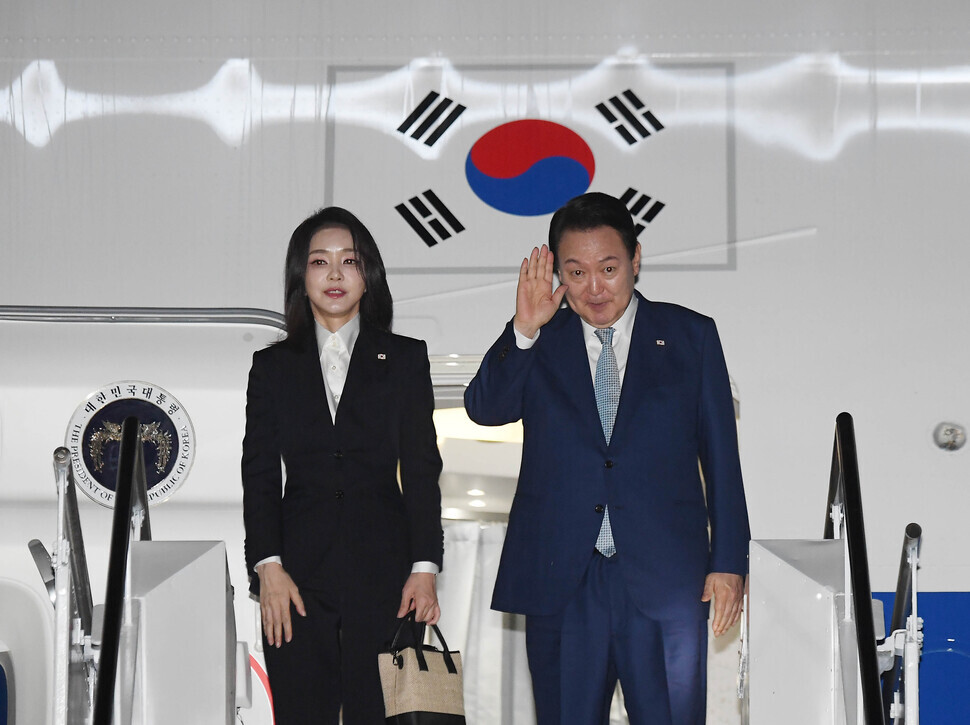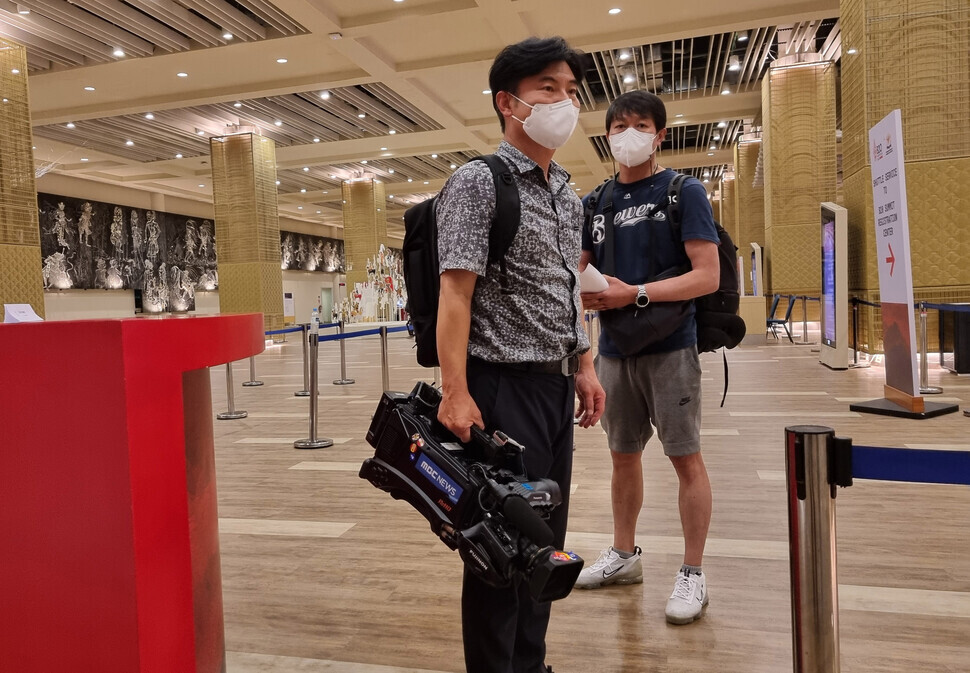hankyoreh
Links to other country sites 다른 나라 사이트 링크
Yoon’s SE Asia trip tainted by scandals over constraints on free press

President Yoon Suk-yeol’s tour of Southeast Asia from Nov. 11 to 16 has been tainted with controversy over restricting and taming the press, particularly regarding the banning of journalists from a particular media company from the presidential airplane, the closed-door nature of Yoon’s major bilateral talks, and his separate chat with friendly journalists in the president’s reserved space on the plane. Observers say the controversy is the result of Yoon’s poor understanding of what constitutes “the public” and his narrow-minded view of the media.
Yoon held his first summit meeting with Chinese President Xi Jinping in Bali, Indonesia, on Tuesday. It was the first bilateral meeting between the South Korean and Chinese leaders since Yoon’s predecessor Moon Jae-in met Xi in Beijing in December of 2019.
However, the summit was not open to the press corps that accompanied Yoon on his tour. Instead, the presidential office had “exclusive coverage,” as it did during Yoon’s summit meetings with the United States and Japan in Phnom Penh, Cambodia on Sunday.
In cases of “exclusive coverage” with the presidential office, reporters are not granted access to all public parts of the summit but are only provided with edited statements, video footage, and photographs.
The presidential office provided only written press statements after Yoon’s summits with the United States, Japan and China. It took no questions from the press.
With summit meetings, introductory remarks and the like are generally open to the press pool. Of course, press pool coverage is sometimes restricted by prior bilateral agreements.
However, given the substantial controversy that resulted after a TV camera picked up Yoon’s apparent use of obscenities during his trip to North America in September, speculation emerged that the Korean side first proposed the “exclusive coverage” for this tour. The presidential office retorted that the measure was the result of “prior bilateral agreements,” and that the speculation was a “misunderstanding resulting from a failure to properly understand summit diplomacy protocols.”

Controversy over Yoon’s seemingly “private” use of the presidential aircraft that emerged after the presidential office refused MBC journalists from boarding the plane immediately prior to the start of the presidential tour intensified during the trip itself.
While en route from Phnom Penh to Bali, the venue of the G20 summit, Yoon held no official inflight conversation with the press, but instead invited two friendly journalists from CBS and Channel A for a separate one-hour chat. Other journalists about the flight witnessed the two reporters moving to the presidential space at the front of the plane after the pair received a message from flight attendants about an hour after liftoff.
A presidential office official said the president simply engaged in some light inflight conversation with the pair as he had an existing relationship with them, and that the conversation “had nothing to do with coverage.”
Critics note that following the boarding ban on the MBC journalists, Yoon’s personal preference for certain media companies is manifesting as public behavior. Ahn Ho-young, a senior spokesperson for the Democratic Party, said in a briefing Tuesday that the presidential airplane is an “official space that runs on taxpayer money,” and that “the sight of the president, who was oblivious to this fact, confirms his warped inability to distinguish the public from the private, as well as his narrow-minded view of the media.”
Wi Seon-hee, spokesperson for the Justice Party, criticized the president’s view of the media as “unfair,” given how he “provides coverage favors to just two journalists while excluding the more than 80 members of the accompanying press corps.”
Yoon returned to Korea on Wednesday morning.
By Bae Ji-hyun, staff reporter
Please direct questions or comments to [english@hani.co.kr]

Editorial・opinion
![[Editorial] Penalties for airing allegations against Korea’s first lady endanger free press [Editorial] Penalties for airing allegations against Korea’s first lady endanger free press](https://flexible.img.hani.co.kr/flexible/normal/500/300/imgdb/original/2024/0502/1817146398095106.jpg) [Editorial] Penalties for airing allegations against Korea’s first lady endanger free press
[Editorial] Penalties for airing allegations against Korea’s first lady endanger free press![[Editorial] Yoon must halt procurement of SM-3 interceptor missiles [Editorial] Yoon must halt procurement of SM-3 interceptor missiles](https://flexible.img.hani.co.kr/flexible/normal/500/300/imgdb/child/2024/0501/17145495551605_1717145495195344.jpg) [Editorial] Yoon must halt procurement of SM-3 interceptor missiles
[Editorial] Yoon must halt procurement of SM-3 interceptor missiles- [Guest essay] Maybe Korea’s rapid population decline is an opportunity, not a crisis
- [Column] Can Yoon steer diplomacy with Russia, China back on track?
- [Column] Season 2 of special prosecutor probe may be coming to Korea soon
- [Column] Park Geun-hye déjà vu in Yoon Suk-yeol
- [Editorial] New weight of N. Korea’s nuclear threats makes dialogue all the more urgent
- [Guest essay] The real reason Korea’s new right wants to dub Rhee a founding father
- [Column] ‘Choson’: Is it time we start referring to N. Korea in its own terms?
- [Editorial] Japan’s rewriting of history with Korea has gone too far
Most viewed articles
- 160% of young Koreans see no need to have kids after marriage
- 2[Editorial] Japan’s rewriting of history with Korea has gone too far
- 3Vietnamese war victims speak of sexual violence by S. Korean troops for the first time
- 4For survivor, Jeju April 3 massacre is a living reality, not dead history
- 5[Column] Park Geun-hye déjà vu in Yoon Suk-yeol
- 6[Reporter’s notebook] In Min’s world, she’s the artist — and NewJeans is her art
- 7[Editorial] Penalties for airing allegations against Korea’s first lady endanger free press
- 8Presidential office warns of veto in response to opposition passing special counsel probe act
- 9Hybe-Ador dispute shines light on pervasive issues behind K-pop’s tidy facade
- 10[Special Feature Series: April 3 Jeju Uprising, Part III] US culpability for the bloodshed on Jeju I